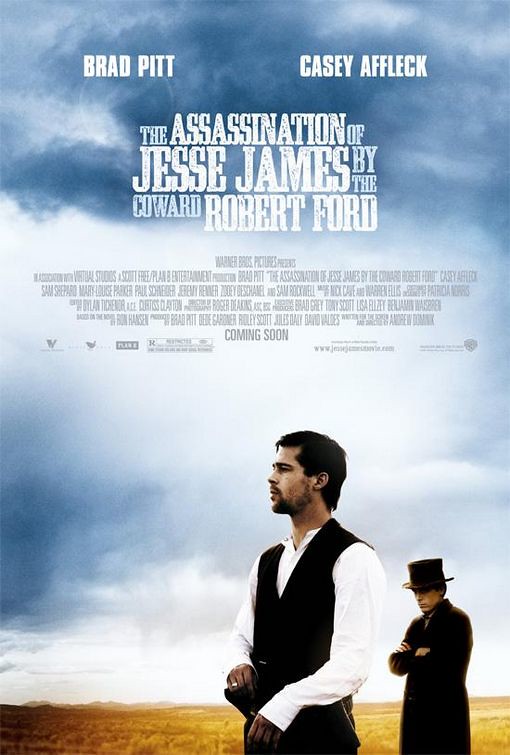
I have a real fascination with madness, with the way madness sets in and changes a man, the way it paradoxically heightens his senses both perceptual and psychic, the way it burns a man out if left hot too long, and the way madness is one of the most contagious diseases man can fall victim to. It's easy to see all that on display here, in both titular characters. Jesse is a folk hero and an old west rock god, not to mention a stonecold killer when the need arises, and the weight of all that is too much for anyone to bear. Bob Ford, on the other hand, is none of these things, except perhaps the last one, and the unbearable lightness of barely being (if I may borrow and abuse a phrase) is too much for him to bear in much the same way.
The kind of humanity on display throughout The Assassination is pretty universal. As it unfolds, Jesse descends from detached celebrity to cult status to paranoid to ivory-tower madness (partially affected, but isn't it always). Correspondingly, Bob goes from hero-worship to cult member to conspirator to broken-hearted assassin. He had to kill Jesse James, not just because he was slowly groomed and coerced into doing so by an exhausted, soul-weary Jesse himself (though there's something to that) but also for the same reason anybody assassinates a celebrity: that same cocktail of love and hate, fear and loathing, fascination and morbidity, and the need to simultaneously prove and defy the truth -- that our gods are in every way mortal. Once the deed is done, Bob gets what every tragic hero gets: everything he wished for, and just as Jesse dragged those around him to misfortune or madness, Bob continues the game. But where Jesse's understanding of people was part of what made him almost superhuman, his ability to know the world and those in it in almost spooky ways, Bob's understanding was too hard-won and came far too late for him to take control of his own destiny. So although they met similar ends, what follows each end is dramatically different: Jesse remains a the legend he was in life, and Bob's hollow celebrity collapses on itself, deflates, and he is forgotten, returning to his status as a footnote in the greater man's life.
This film is poetry, in its dialogue, in its far-reaching themes and its psychoanalysis of epic characters, and in its astounding photography -- that makes two films in a row for me set in the Gothic Old West that explore the dark places in a man's soul and do so with magnificent expressionistic photography. (Sidebar: somehow I either did not know or completely forgot that this was shot by Roger Deakins. Hardly surprising. Talk about superhuman.) The performances here are subtle and powerful, with beautifully lived-in and filled-out secondary characters and some of my favorite work from Brad Pitt, Casey Affleck and Sam Rockwell -- all three of whom have long lists of great work.
I know the Oscars are a famously bad measure of quality cinema, but lately (I guess it's the time of year and all) every time I watch a movie this undeniably cinematically great I feel the need to peek at how it was rewarded when it came out. Of course Assassination was overlooked, but it reminded me that 2007 was the year of this, There Will Be Blood, No Country For Old Men, Eastern Promises, Zodiac, The Diving Bell and the Butterfly, I'm Not There... I keep lamenting how ambitionless 2010 seemed -- well, the truth is I realize now I'm comparing it to 2007. 2007 is the bar. Not to harp on the case, but it was also the year of Ratatouille, Gone Baby Gone, Michael Clayton, The Lookout, the Grindhouse double feature, Sunshine, hell even The Darjeeling Limited and my favorite Harry Potter movie. Put it all together and 2007 looked like a year where film could do anything. Looking over this list, even a lot of the bad movies seemed eager to try something new or break with tradition.
I'm just saying, if The Assassination of Jesse James by the Coward Robert Ford came out in 2010, I would have called it the best movie of the year. But the truth is, it's sadly hard to imagine that happening. Maybe 2011 will be better.

No comments:
Post a Comment